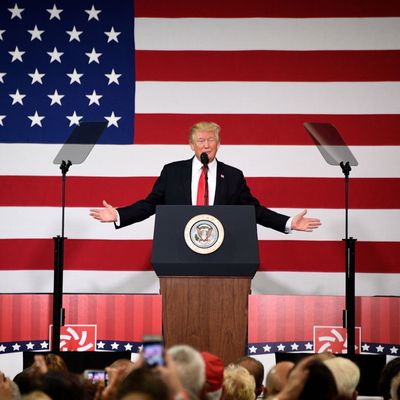
Virtually no one in the United States believes that taxes on corporations and wealthy individuals should be cut. In one recent Gallup survey, just 9 percent of respondents said corporations paid too much in taxes, while 67 percent said they paid too little; for “upper income people,” those figures were 10 and 63, respectively.
But even these numbers fail to convey the dearth of public demand for the Republican Party’s tax “reform” effort. Voters don’t merely lack enthusiasm for cutting taxes on the rich and powerful — most don’t even see a need for their taxes to be cut. In April, Gallup found 61 percent of Americans saying that their current income-tax burden is “fair” — the highest that figure has been at any point since 2009. Meanwhile, even those who believe that they deserve a tax cut don’t (generally) see such a measure as worth prioritizing: Last month, a Bloomberg poll found that less than 5 percent of Americans believe tax policy is the “most important issue facing the country” — less than half the percentage that picked climate change.
And this common wisdom has much to recommend it. America’s wealthiest have already hoarded three decades’ worth of economic growth; America’s effective corporate tax rate is already competitive with those of other nations. Meanwhile, we’ve got to finance the growing costs of the baby boomers’ mass retirement; restore the nation’s decaying infrastructure; and, now, rebuild our fourth-largest city. The notion that Congress should make “dramatically reducing federal revenue so as to increase the post-tax income of the one percent” it’s top priority is so indefensible, even tea party Republicans won’t argue forthrightly for their agenda. Donald Trump didn’t win the White House on a promise to cut taxes for the rich, but on a vow to raise wages for middle-income workers, while cracking down on “special interests” (and, ya know, do all that racist stuff).
But the GOP donor class expects a return on its investment. And so, on Wednesday, the president tried to make a plan for doing their bidding sound like one for doing the American people’s.
Addressing supporters in Springfield, Missouri, Trump tried to sell his massive giveaway to the one percent as a “pro-jobs, pro-worker, and pro-America” tax plan. The president called for closing loopholes on “special interests” — although he never specified which loopholes he was talking about. He argued that cutting taxes on corporations would allow them to raise wages for their workers (even though most savings from corporate tax cuts go to shareholders and CEOs, and what does trickle down to workers rarely makes it below management). In a surprising endorsement of Keynesian economics, he claimed that allowing “middle-income Americans” to “keep more of their hard-earned paychecks” would boost economic growth, because such households would “go out and spend their money” on products (even though his tax plan, and all of the congressional GOP’s, concentrates gains on high-income households who would be less likely to spend their tax cut savings). And he insisted that cutting the corporate tax rate was necessary to attract companies to the United States — and that this would redound to the benefit of workers because “when businesses compete for labor your wages will go up” (even though the Trump administration has pushed anti-competitive and wage-suppressing regulatory policies from its inception).
Most ambitiously, Trump tried to make rewarding corporate-tax evaders with a special, discount rate on their repatriated earnings sound populist. The president argued that America’s “high tax rate” and “outdated, bureaucratic rules” had caused large companies to hoard “anywhere from $3 to $5 trillion” overseas — but by “making it less punitive for companies to bring back their money,” we could return “trillions of dollars to our economy” (even though virtually no one benefits from corporate tax holidays other than wealthy shareholders).
Whether this performance won any hearts and minds remains to be seen. What it absolutely did not do was give congressional Republicans any actionable guidance on how to hash out the details of their plan. There is every reason to think that the GOP will recognize that they don’t have the political skill or support to execute tax reform — changing the code so that taxes go up for some, down for others — and will settle for deficit-financed tax cuts.
But even the latter could prove too heavy a lift. Trump gave his speech in Missouri so as to put pressure on the red state’s Democratic senator, Claire McCaskill, who is up for reelection in 2018. But for all McCaskill’s political vulnerability, she’s felt perfectly comfortable committing to oppose any plan that lowers taxes for people making over $1 million. And why shouldn’t she? The Democratic Party might not be very popular in Missouri — but neither is redistributing wealth to multimillionaires.
To pass their tax plan, the GOP is relying on an unpopular president to mobilize public support for an unpopular policy. Selling supply-side snake oil — in this economy — might be the most difficult con of Trump’s illustrious career. On Wednesday, he didn’t seem up to the challenge.
But his party’s “special interests” just might be.






























